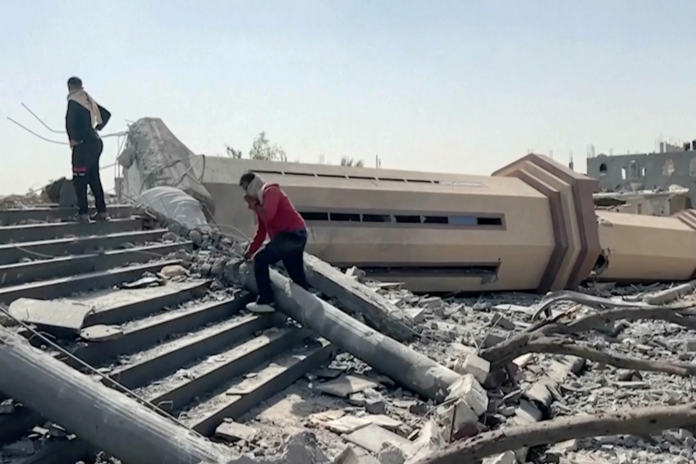Massive explosions reverberated across parts of Iran after Israel launched an intense retaliatory strike. The move by Israel follows a pattern of hostilities in the region that have only grown more pronounced over the past year. According to reports, the strike was in response to attacks by Iran and its regional proxies, whom Israel accuses of instigating violence against its territory and citizens.

This action marks a significant moment in the ongoing conflict, with Israel defending its sovereignty and affirming its commitment to security. The Israel Defence Forces (IDF) released a strong statement justifying the strike, saying, “The regime in Iran and its proxies in the region have been relentlessly attacking Israel since October 7th of last year. Like every other sovereign country in the world, the State of Israel has the right and the duty to respond.”
Background of the Conflict: Tensions Dating Back Decades
The Israel-Iran rivalry is deeply rooted in ideological, political, and territorial conflicts that date back decades. Iran’s support for anti-Israel factions like Hezbollah in Lebanon and Hamas in Gaza has long fueled the animosity between the two countries. Israel, for its part, perceives Iran’s nuclear ambitions as a direct threat to its existence and has repeatedly called for international sanctions to curb Iran’s nuclear program.
In recent years, this hostility has been characterized by a “shadow war” — covert operations, cyberattacks, and targeted airstrikes on Iranian-linked sites in Syria and Iraq. Israel has reportedly attacked Iranian weapon shipments meant for Hezbollah, thereby ensuring its adversary does not strengthen its position along Israel’s borders. However, the recent open military strike represents a shift from indirect confrontations to direct engagements, bringing tensions to a boiling point.
Israel’s Justification: A Right to Self-Defense
From Israel’s perspective, the strike on Iran is a necessary act of self-defense. The IDF has emphasized that recent provocations have made this action inevitable. Since October 7 of the previous year, Iran and its allies have allegedly orchestrated attacks on Israel, making it difficult for the Israeli government to ignore the escalating threat.
Israel’s stance aligns with the principles of international law, which grant sovereign nations the right to defend themselves against external aggression. “Like every other sovereign country in the world, the State of Israel has the right and the duty to respond,” the IDF stated, reinforcing the notion that its military actions are not acts of aggression but defensive measures to ensure national security.
The Impact on Regional Stability
The Israel-Iran conflict, already one of the most complex and enduring rivalries in the Middle East, has broader implications for the region. Israel’s latest strike on Iran not only heightens the immediate threat of a military escalation between these two powers but also threatens to destabilize neighboring regions.
Countries like Syria, Iraq, and Lebanon, where Iranian influence is significant, could see increased violence as proxies engage in retaliatory attacks. The possibility of proxy conflicts adds to the already volatile situation, where regional players like Saudi Arabia, Turkey, and the Gulf states may feel compelled to respond or mediate.

Moreover, this escalation could affect oil prices, disrupt shipping lanes in the Persian Gulf, and contribute to regional instability that might involve the United States, Russia, and other world powers.
Global Reactions and the Role of the United Nations
The international response to this latest conflict escalation has been mixed. While some countries recognize Israel’s right to self-defense, others express concern about the potential for a larger regional conflict. The United States, a close ally of Israel, has previously supported Israel’s security actions but has also encouraged diplomatic solutions with Iran, especially concerning the Iranian nuclear issue. Washington is likely to call for restraint while also supporting Israel’s right to counter threats.
The United Nations may convene an emergency session to address the situation, given the risk of a prolonged conflict. However, achieving consensus will be challenging, as countries with ties to Iran, such as Russia and China, may push back against unilateral actions by Israel. The UN’s stance will largely focus on peace and stability, but its effectiveness in diffusing tensions remains uncertain.
The Road Ahead: A Fragile Peace or Increased Hostility?
As Israel and Iran brace for what could be a protracted standoff, the world watches with bated breath. While the recent strike sends a powerful message from Israel, Iran’s potential response remains unpredictable. Iran has, in the past, vowed to retaliate against attacks on its territory, especially if perceived as direct assaults on its sovereignty.
Israel’s government and military leaders understand the delicate balance they must maintain. While demonstrating strength is necessary to deter aggression, a full-scale conflict could have severe consequences, drawing multiple nations into a devastating war. Diplomatic channels, therefore, remain a critical tool, even as military might takes the forefront.
For now, Israel’s strike on Iran underscores the deep-seated divisions and the precarious state of Middle Eastern geopolitics. Both nations are likely calculating their next steps carefully, with Israel focused on ensuring its security and Iran weighing its options for a potential counter-strike.

